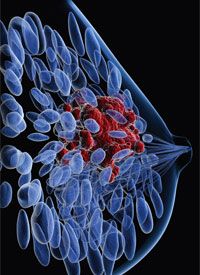Off-the-Shelf Vaccine Investigated in Phase II Study of TNBC for Recurrence Prevention
A novel therapeutic vaccine, TPIV200, is being investigated in a new randomized, multicenter, double-blinded, placebo-controlled phase II clinical trial in patients with triple-negative breast cancer TNBC.
breast cancer

A novel therapeutic vaccine, TPIV200, is being investigated in a new randomized, multicenter, double-blinded, placebo-controlled phase II clinical trial in patients with triple-negative breast cancer (TNBC). The study is evaluating the use of the vaccine for the prevention of cancer recurrence for women with TNBC, according to a press release from TapImmune Inc., the company developing the vaccine.
TPIV200 is a multi-epitope folate receptor alpha peptide vaccine that can stimulate CD4-positive and CD8-positive T cells to target tumors. The off-the-shelf vaccine has demonstrated the ability to induce long-lasting T-cell immune responses against folate receptor alpha, which is overexpressed in many TNBC and ovarian cancer cells, and is associated with cancer recurrence.
The trial, which enrolled its first patient of 280 planned patients in December 2017, is being funded by the US Department of Defense, as a result of a $13.3 million grant awarded to Keith L. Knutson, PhD, who developed the vaccine, and Edith A. Perez, MD, both of Mayo Clinic in Jacksonville, Florida.
"We remain grateful to the US Department of Defense and Mayo Clinic for enabling TapImmune to gain invaluable clinical safety and efficacy insight for TPIV200 under this grant," said Peter Hoang, president and CEO of TapImmune, in a statement. "We believe TPIV200 and our other vaccine candidates have an important role to play within the current immuno-oncology ecosystem by potentially bridging a critical gap not currently addressed by other immunotherapies, which have shown promise in only a small number of patients. Unlike current approaches, TapImmune's vaccines are designed to produce broad-based, durable T-cell responses in the vast majority of patients, which we believe are essential for improving clinical outcomes and ensuring potential regulatory and commercial success. We look forward to providing updates appropriately as this exciting phase II study continues to enroll patients."
Patients with stage Ib to IV TNBC who have completed surgery and radiation therapy or chemotherapy will be enrolled into 1 of the 2 treatment arms of cyclophosphamide and sargramostim with either TPIV200 or placebo. In the investigational arm, patients will receive oral cyclophosphamide twice daily on days 1 to 7 and 15 to 21 in course 1 followed by TPIV200 with sargramostim intradermally on day 1 of course 2. Treatment would repeat every 28 days for course 2 through 7 and every 6 months for courses 8 to 14 until progression of disease or unacceptable toxicity. Patients will undergo follow-up for 3 years.
The primary endpoint of the study is disease-free survival with secondary endpoints of safety and tolerability of the combination. Investigators will also assess potential prognostic factors for vaccine immune response or cancer relapse, including levels of tumor expression of folate receptor alpha at baseline.
TPIV200 received an orphan drug designation from the FDA in 2015 for the treatment of women with ovarian cancer. The vaccine is continuing to be investigated in various clinical trials as a single agent and as a part of combination regimens for patients with ovarian cancer and breast cancer. A 4-arm randomized dosing trial of TPIV200 in patients with TNBC also recently completed patient enrollment and is expected to release interim results in the first half of 2018.